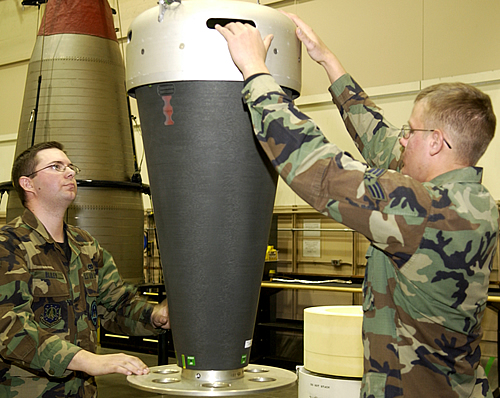Pentagon Misses Warhead Retirement Deadline
 |
| Retirement of the W62 warhead, seen here at Warren Air Force Base, has been been delayed. |
.
By Hans M. Kristensen
The Pentagon has missed the deadline set by the 2001 Nuclear Posture Review for the retirement of the W62 nuclear warhead.
Retirement of the warhead, which arms a portion of the 450 U.S. Minuteman III intercontinental ballistic missiles, was scheduled for completion in Fiscal Year 2009, which ended on September 30th.
But the Department of Defense has been unable to confirm the warhead has been retired, saying instead earlier today: “The retirement of the W62 is progressing toward completion.”
The 2001 Nuclear Posture Review decided that, “the W62 will be retired by the end of Fiscal Year 2009.” The schedule was later reaffirmed by government officials and budget documents. But the February 2009 NNSA budget for Fiscal Year 2010 did not report a retirement but a reduction in “W62 Stockpile Systems” – meaning the warhead was still in the Department of Defense stockpile, adding that a final annual assessment report and dismantlement activities will be accomplished in FY2010.
Offloading of the W62 from the Minuteman force has been underway for the past several years. First deployed in 1970, the W62 has a yield of 170 kilotons and is the oldest and least safe warhead in the U.S. stockpile. It is being replaced on the Minuteman III by the 310-kiloton W87 warhead previously deployed on the MX/Peacekeeper missile.
This publication was made possible by a grant from Carnegie Corporation of New York and Ploughshares Fund. The statements made and views expressed are solely the responsibility of the author.
The last remaining agreement limiting U.S. and Russian nuclear weapons has now expired. For the first time since 1972, there is no treaty-bound cap on strategic nuclear weapons.
The Pentagon’s new report provides additional context and useful perspectives on events in China that took place over the past year.
Successful NC3 modernization must do more than update hardware and software: it must integrate emerging technologies in ways that enhance resilience, ensure meaningful human control, and preserve strategic stability.
The FY2026 National Defense Authorization Act (NDAA) paints a picture of a Congress that is working to both protect and accelerate nuclear modernization programs while simultaneously lacking trust in the Pentagon and the Department of Energy to execute them.